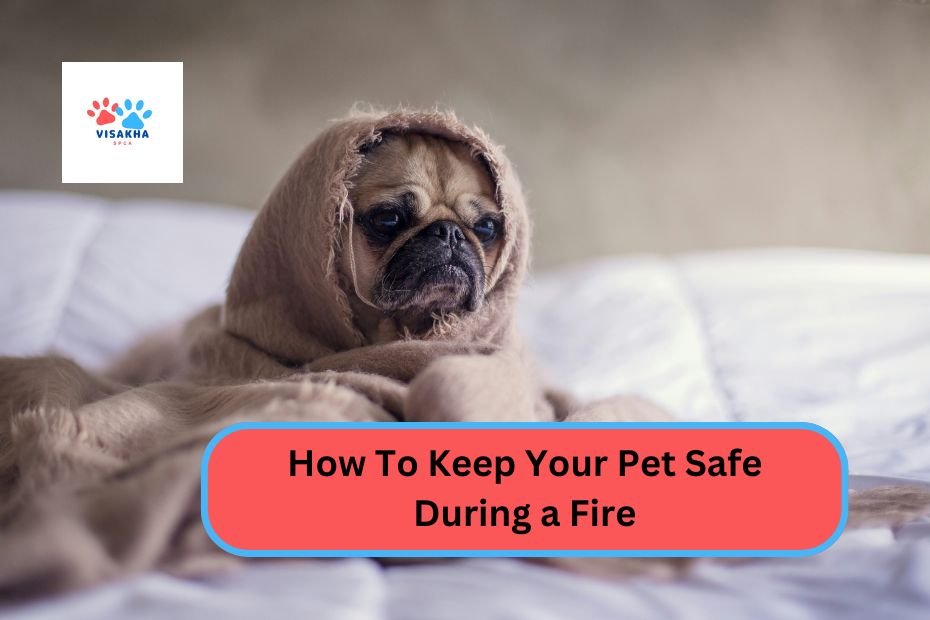Fires can be incredibly dangerous for both humans and pets, but with proper preparation and quick action, you can increase the chances of your pet’s survival in the event of a fire. Here are key steps to help keep your pet safe during a fire.
1. Create a Fire Evacuation Plan
- Prepare in Advance: Make a fire safety plan that includes your pet. Know the quickest exits and where your pet’s essential items, like leashes, carriers, or food, are located.
- Assign Responsibilities: If you live with others, assign each person a specific task, such as grabbing the pet or gathering supplies. Practicing your escape plan regularly will ensure everyone knows what to do.
- Practice Fire Drills: Practice evacuating your home with your pets. Familiarize them with the sound of fire alarms so they don’t panic if it goes off. Make sure you can easily access carriers and leashes to quickly gather them up.
2. Use Pet Alert Stickers
- Place in Visible Locations: Put pet alert stickers on your windows or doors to notify firefighters that there are pets inside your home. Indicate the type and number of pets in case you’re not home when a fire occurs.
- Keep Information Up-to-Date: Regularly update the information on the sticker if you add or lose pets.
3. Keep Collars, Leashes, and Carriers Handy
- Ready to Grab: Always have your pet’s collar with an ID tag on them and leashes in easy-to-reach places, preferably near exits. If your pet needs a carrier, keep it somewhere accessible for quick evacuation.
- Microchip Your Pets: In case your pet gets lost during a fire, having them microchipped will greatly improve the chances of being reunited.
4. Plan for Pet Safety When You’re Away
- Contain Your Pets: When leaving home, especially for extended periods, consider keeping pets in rooms near an exit. This will allow firefighters to locate them more easily and speed up the evacuation process.
- Notify Neighbors: Inform a trusted neighbor that you have pets. They might be able to help rescue them if you’re not home when a fire occurs.
5. Know Your Pet’s Hiding Spots
- Find Quickly in Emergencies: In stressful situations like a fire, pets often hide out of fear. Know your pet’s favorite hiding spots so you can find them quickly during an emergency.
- Train for Quick Response: If possible, train your pets to come to you when called. This will save valuable time during an evacuation.
6. Install and Maintain Smoke Detectors
- Early Warning: Install smoke detectors in your home, especially near places where your pets sleep. Test them regularly and replace the batteries as needed. The quicker you’re alerted to a fire, the more time you have to evacuate yourself and your pets.
- Fire Alarms with Pet Sensitivity: Some companies offer fire alarms that emit frequencies audible to pets, potentially helping to alert them sooner.
7. Stay Calm During an Evacuation
- Minimize Stress: Pets can sense stress and panic, which may cause them to hide or become uncooperative during an emergency. Remain as calm as possible when evacuating and speak in soothing tones to avoid frightening your pet further.
- Leave and Call for Help: If the situation is life-threatening and you can’t get to your pet, leave the home and call emergency services immediately. Tell firefighters about your pets’ location and type so they can attempt to rescue them.
8. After a Fire: Monitor Your Pet’s Health
- Post-Fire Veterinary Care: After escaping a fire, it’s important to get your pet checked by a veterinarian, even if they appear to be uninjured. Smoke inhalation or burns may not be immediately visible but can have long-term effects on your pet’s health.
- Offer Comfort and Reassurance: Pets can be traumatized after experiencing a fire. Offer them comfort, keep them in a quiet, safe space, and provide extra attention to help them recover from the experience.
Conclusion
By planning ahead and taking a few proactive steps, you can greatly improve the chances of keeping your pet safe during a fire. Create a solid fire safety plan, keep essential pet items easily accessible, and always stay calm during an emergency. Fires can be overwhelming, but having a well-rehearsed plan in place will give you the best chance of protecting your pet and getting them to safety.

